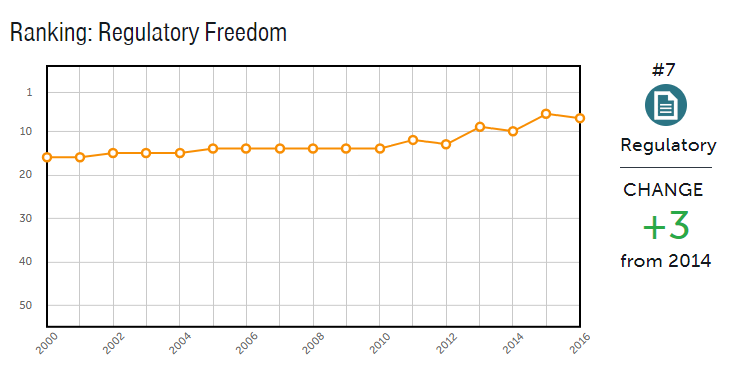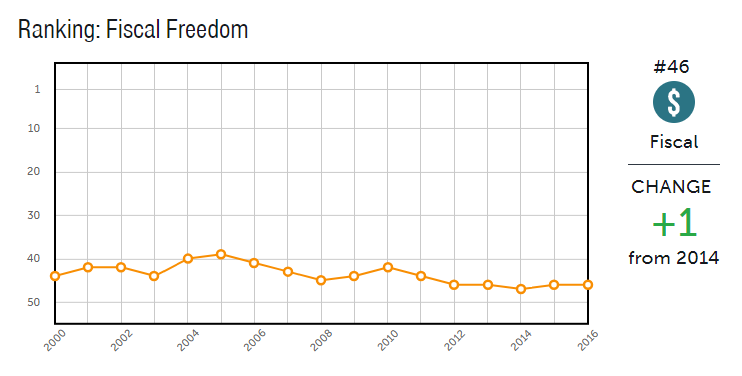Cato Institute’s Freedom in the Fifty States tracks freedom based on fiscal policy, regulatory policy, and personal freedom. Mississippi came in at 40th overall, a five spot jump from 2014, though still lower than our peak of 32 in the early-2000s.
So what are we doing well?
Our regulatory policy is in the top 10, and is moving in the right direction. Two years ago, lawmakers adopted a new law that will require all new licensing regulations to be approved before they take effect, ensuring new attempts to stifle competition will be reviewed before they are finalized.

On land use freedom, health insurance freedom, labor market freedom, lawsuit freedom, and occupational freedom, which all encompass our regulatory policy, Mississippi is in the top half of all states in each category.
That was the good. But when it comes to fiscal policy, we have much room for growth. And it appears we are only moving backwards.

Fiscal policy includes state and local taxation, government consumption, investment, employment, and debt. Essentially, how much are you being taxed and how much of our economic activity is controlled by government?
“Mississippians’ overall tax burden is a bit above average nationally at 9.9 percent, but local taxes are quite low. This fiscal centralization goes along with a lack of choice among local government (less than 0.4 per 100 square miles). Debt is much lower than average, but government employment and consumption are far higher than average. State and local employment is 17.7 percent of private sector employment,” the report notes.
Policy recommendations? Reduce spending on health and hospitals, where we are the third most liberal spending state, and on education and public welfare, where we spend well more than the national average as a share of the economy. Make government smaller, and reduce state taxes.
Two years ago the legislature eliminated the 3 percent income tax bracket, permitted self-employed individuals to deduct half of their federal self-employment taxes, and removed the franchise tax on property and capital when fully implemented. That will help our future rankings.
And while fiscal freedom has been going in the wrong direction, we are on the right course in personal freedom, largely due to the criminal justice reforms lawmakers have begun to make. We currently came in 34th. To move in to the top half, we need to continue on the right path with those reforms.
Among our four border states, we were the only state below 31st overall. Alabama, Louisiana, and Arkansas were rated 28th, 30th, and 31st respectively. The outlier- in a good way- was Tennessee at 7th.
| State | Overall | Fiscal | Regulatory | Personal |
| Mississippi | 40 | 46 | 7 | 34 |
| Alabama | 28 | 19 | 23 | 49 |
| Arkansas | 31 | 33 | 14 | 47 |
| Louisiana | 30 | 22 | 32 | 30 |
| Tennessee | 7 | 3 | 10 | 45 |
As we mentioned, regulatory policy is our strength and Mississippi’s 7th place ranking topped all neighboring states, including Tennessee. Personal freedom was a wash, only Louisiana enjoyed a rating higher than our 34th.
It comes back to fiscal policy. Arkansas is ranked 33rd, Louisiana is 22nd, Alabama is 19th. Tennessee? 3rd. So what are they doing? “The Volunteer State lacks an income tax, and both state and local tax collections fall below the national average. We show state-level taxes falling from 5.1 percent of adjusted personal income in FY 2007 to 4.3 percent in FY 2014 and then back up to 4.5 percent in FY 2017. Local taxes have also fallen a bit since 2006, from about 3.7 to 3.3 percent of income. State and local debt is low, at 17.2 percent of income, and so is government consumption and investment, at 9.7 percent of income. Government employment is only 10.7 percent of private employment, a big drop since 2010 as the job market has recovered,” the report mentions.
Over the past several years, Mississippi has made improvements in several areas. Only five states made greater gains over the past four years. Still, 40th isn’t where we want to hang our hat. By moving our fiscal policies closer to our neighbors, we will begin to enjoy a freer, and more prosperous, state.